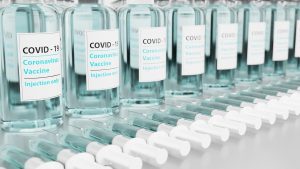Chinese media outlet Caixin is reporting that China plans to use an mRNA vaccine, jointly developed by China’s Fosun Pharma and German company BioNTech, as a booster shot for those who have been fully vaccinated using Chinese vaccines.
“Chinese authorities plan to use the vaccine, which goes by the brand name Comirnaty, as a booster shot for people who have received inactivated-virus vaccines, people close to regulators told Caixin,” according to the report. The vaccines produced by Chinese companies – including China’s two leading COVID-19 vaccine producers, Sinopharm and Sinovac – both use inactivated particles of the virus, rather than the newer mRNA technology, to produce an immune response.
The Comirnaty vaccine is being widely used in developed countries, including the United States. In much of the world, it is a joint production with U.S. firm Pfizer, but Fosun has exclusive rights to manufacture and distribute the vaccine within China (a point that has caused some headaches for Taiwan).
The BioNTech vaccine is currently awaiting government approval in China. An advisory panel just cleared the vaccine for use on Thursday, and now it is awaiting final approval from the National Medical Products Administration. Fosun hopes to start trial production by the end of August, according to a shareholder’s meeting this week
The BioNTech vaccine is 95 percent effective at preventing COVID-19, according to trial data. That efficacy has held up well even against the ferocious new Delta variant, which spreads over 200 percent more quickly than the original strain of the virus. The BioNTech vaccine was reported to be 84 percent effective at preventing infection from the Delta strain and 96 percent effective at preventing hospitalizations. However, that level of protection only comes after receiving two shots of the vaccine, the recommended dose.
China is still studying what levels of protection are possible by recombining vaccines, something first raised by Gao Fu, the head of China’s Center for Disease Control, back in April. At the time, Gao said that Chinese vaccines “don’t have very high protection rates” and added that officials are considering “whether we should use different vaccines from different technical lines for the immunization process.”
Gao’s comments, which he later tried to walk back, added fuel to the fire of speculation about the efficiency of Chinese-made vaccines. Data from various trials of Sinopharm and Sinovac shots had suggested efficacy levels of anywhere between 50 and 80 percent, but full data has not been released so far. And that’s only for the original strain of the virus – neither Sinopharm nor Sinovac has released data from trials involving the Delta variant as of this writing.
But there is some concerning real-world evidence that Chinese vaccines are not enough to guard against an outbreak of the Delta variant. In the Seychelles, 72.7 percent of the population has received at least one dose of vaccine, and as of May, 57 percent of its administered vaccines were from Sinopharm. Yet daily cases counts reached an all-time high for the Seychelles in May, and the country is still notching over 1,000 new cases per million people each day. By comparison, at the worst of their respective outbreaks, the U.S., U.K., and India never topped the 1,000-cases-per-million daily mark. The Seychelles has confirmed that a third of new COVID-19 cases in the country are occurring among fully vaccinated people, although it hasn’t revealed data on which vaccines were used in those cases (the Seychelles also uses the AstraZeneca vaccine).
Likewise, in Indonesia, currently the COVID-19 hotspot in the Asia-Pacific, as of mid-June over 350 doctors and nurses had been infected with COVID-19 despite being fully vaccinated with Sinovac. This week, the Indonesian government announced that it will give healthcare workers a third vaccine dose, this time using the Moderna mRNA vaccine, to shore up protection.
But perhaps the best case for skepticism over the efficiency of Chinese vaccines comes from China itself. China, despite having administered over 1.4 billion doses of COVID-19 vaccines to date, has no plans to relax its border restrictions until at least 2022. That alone suggests less than full confidence in the protection provided by China’s vaccination drive, which may be why the country is now considering administering booster shots using an entirely different vaccine technology.
































